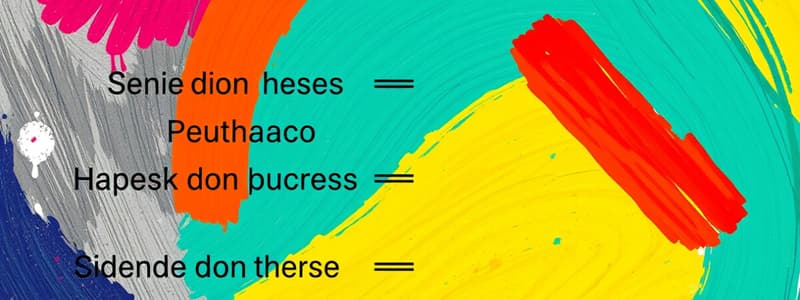Podcast
Questions and Answers
What is the primary use of the conditional tense in Spanish?
What is the primary use of the conditional tense in Spanish?
The conditional tense is used to express what we could or would do.
How do you form the conditional tense for regular verbs in Spanish?
How do you form the conditional tense for regular verbs in Spanish?
You keep the infinitive and add the appropriate endings: ía, ías, ía, íamos, íais, and ían.
What is the conditional form for 'nosotros' in Spanish?
What is the conditional form for 'nosotros' in Spanish?
The conditional form for 'nosotros' is 'íamos'.
List the conditional endings for the verb form 'tú'.
List the conditional endings for the verb form 'tú'.
What would be the conditional ending for 'ellos/ellas/ustedes'?
What would be the conditional ending for 'ellos/ellas/ustedes'?
What is the conditional form of 'yo' for the verb 'trabajar'?
What is the conditional form of 'yo' for the verb 'trabajar'?
How would you say 'you would work' in Spanish using the verb 'trabajar'?
How would you say 'you would work' in Spanish using the verb 'trabajar'?
Translate 'we would work' into Spanish using the verb 'trabajar'.
Translate 'we would work' into Spanish using the verb 'trabajar'.
What is the translation for 'they would work' in Spanish?
What is the translation for 'they would work' in Spanish?
How do you express 'he/she/you (formal) would work' with the verb 'trabajar'?
How do you express 'he/she/you (formal) would work' with the verb 'trabajar'?
What is the irregular stem for the verb 'hacer' in the conditional tense?
What is the irregular stem for the verb 'hacer' in the conditional tense?
Which irregular verb has the stem 'pondr-' in the conditional tense?
Which irregular verb has the stem 'pondr-' in the conditional tense?
How do the irregular verbs in the conditional tense relate to the future simple tense?
How do the irregular verbs in the conditional tense relate to the future simple tense?
What is the conditional form for 'ellos' of the verb 'venir'?
What is the conditional form for 'ellos' of the verb 'venir'?
Identify the irregular stem for the verb 'tener' in the conditional tense.
Identify the irregular stem for the verb 'tener' in the conditional tense.
What is the irregular stem for the verb 'decir' in the conditional tense?
What is the irregular stem for the verb 'decir' in the conditional tense?
Explain how the irregular verbs in the conditional tense function compared to regular verbs.
Explain how the irregular verbs in the conditional tense function compared to regular verbs.
What would be the conditional form for 'yo' using the verb 'poder'?
What would be the conditional form for 'yo' using the verb 'poder'?
List two irregular verbs in the conditional tense and their corresponding irregular stems.
List two irregular verbs in the conditional tense and their corresponding irregular stems.
What do all irregular verbs in the conditional tense have in common regarding their endings?
What do all irregular verbs in the conditional tense have in common regarding their endings?
How would you express 'He would say' in Spanish using the verb 'decir'?
How would you express 'He would say' in Spanish using the verb 'decir'?
Translate 'You would have' into Spanish.
Translate 'You would have' into Spanish.
What is the conditional form for 'we would say' in Spanish?
What is the conditional form for 'we would say' in Spanish?
How do you say 'They would have' in Spanish?
How do you say 'They would have' in Spanish?
What would be the expression for 'You (plural) would say' in Spanish?
What would be the expression for 'You (plural) would say' in Spanish?
What would you say in Spanish if you wanted to express that you would eat more if you were hungry?
What would you say in Spanish if you wanted to express that you would eat more if you were hungry?
Translate the phrase 'They would visit their friend if he lived close by' into Spanish.
Translate the phrase 'They would visit their friend if he lived close by' into Spanish.
How would you express in Spanish that you would be able to swim in the pool?
How would you express in Spanish that you would be able to swim in the pool?
What is the Spanish translation for 'They would love to see the new movie'?
What is the Spanish translation for 'They would love to see the new movie'?
If you were to express a desire to start playing tennis in Spanish, how would you say it?
If you were to express a desire to start playing tennis in Spanish, how would you say it?
How do you say 'I would be able to' in Spanish using the conditional tense?
How do you say 'I would be able to' in Spanish using the conditional tense?
What would be the Spanish translation for 'I would put'?
What would be the Spanish translation for 'I would put'?
Translate 'If I got my driving licence I would buy a new car' into Spanish.
Translate 'If I got my driving licence I would buy a new car' into Spanish.
Flashcards are hidden until you start studying
Study Notes
Conditional Tense Overview
- The conditional tense expresses actions that one could do or would do under certain circumstances.
- It is applicable to all verb groups, ensuring uniformity across regular and irregular verbs.
Verb Endings for Conditional Tense
- The infinitive form of the verb remains unchanged.
- Specific endings are added to the infinitive based on the subject:
- Yo: -ía
- Tú: -ías
- Él/Ella/Usted: -ía
- Nosotros: -íamos
- Vosotros: -íais
- Ellos/Ellas/Ustedes: -ían
Conditional Verb Conjugation in Spanish
- The verb "trabajar" means "to work" in English.
- Conditional tense is used to express actions that would happen under certain conditions.
Conjugation Breakdown
- Trabajaría: "I would work"
- Trabajarías: "You would work" (singular, informal)
- Trabajaría: "He/She/You (formal) would work" (same conjugation as "I would work")
- Trabajaríamos: "We would work"
- Trabajaríais: "You (plural, informal) would work"
- Trabajarían: "They would work" or "You (plural, formal) would work"
Language Notes
- The conditional form indicates hypothetical situations or polite requests.
- The form is consistent across first and third person singular (I/he/she), reflecting similarities in verb endings.
Irregular Verbs in Conditional Tense
- There are 12 irregular verbs in the conditional tense that have unique stems.
- The pattern of irregularity in these verbs mirrors that of the future simple tense.
- To form the conditional tense, use the irregular stem and apply regular verb endings.
List of Irregular Verbs and Their Stems
-
Caber: to fit
- Irregular Stem: cabr-
- Él/Ella: cabría
-
Decir: to say
- Irregular Stem: dir-
- Él/Ella: diría
-
Haber: to have (There is/are)
- Irregular Stem: habr-
- Él/Ella: habría
-
Hacer: to do/make
- Irregular Stem: har-
- Él/Ella: haría
-
Poder: to be able to (can)
- Irregular Stem: podr-
- Él/Ella: podría
-
Poner: to put
- Irregular Stem: pondr-
- Él/Ella: pondría
-
Querer: to want/love
- Irregular Stem: querr-
- Él/Ella: querría
-
Saber: to know
- Irregular Stem: sabr-
- Él/Ella: sabría
-
Salir: to go out/leave
- Irregular Stem: saldr-
- Él/Ella: saldría
-
Tener: to have
- Irregular Stem: tendr-
- Él/Ella: tendría
-
Valer: to be worth
- Irregular Stem: valdr-
- Él/Ella: valdría
-
Venir: to come
- Irregular Stem: vendr-
- Él/Ella: vendría
Irregular Verbs in Conditional Tense
- There are 12 irregular verbs in the conditional tense that have unique stems.
- The pattern of irregularity in these verbs mirrors that of the future simple tense.
- To form the conditional tense, use the irregular stem and apply regular verb endings.
List of Irregular Verbs and Their Stems
-
Caber: to fit
- Irregular Stem: cabr-
- Él/Ella: cabría
-
Decir: to say
- Irregular Stem: dir-
- Él/Ella: diría
-
Haber: to have (There is/are)
- Irregular Stem: habr-
- Él/Ella: habría
-
Hacer: to do/make
- Irregular Stem: har-
- Él/Ella: haría
-
Poder: to be able to (can)
- Irregular Stem: podr-
- Él/Ella: podría
-
Poner: to put
- Irregular Stem: pondr-
- Él/Ella: pondría
-
Querer: to want/love
- Irregular Stem: querr-
- Él/Ella: querría
-
Saber: to know
- Irregular Stem: sabr-
- Él/Ella: sabría
-
Salir: to go out/leave
- Irregular Stem: saldr-
- Él/Ella: saldría
-
Tener: to have
- Irregular Stem: tendr-
- Él/Ella: tendría
-
Valer: to be worth
- Irregular Stem: valdr-
- Él/Ella: valdría
-
Venir: to come
- Irregular Stem: vendr-
- Él/Ella: vendría
Future Conditional Conjugation in Spanish
- The future conditional tense is used to express hypothetical statements or actions that could occur under certain conditions.
Verb "Decir" (to say)
- Conjugation:
- Yo diría: I would say
- Tú dirías: You would say
- Él/Ella diría: He/She would say
- Nosotros diríamos: We would say
- Vosotros diríais: Ye would say
- Ellos/Ellas dirían: They would say
Verb "Tener" (to have)
- Conjugation:
- Yo tendría: I would have
- Tú tendrías: You would have
- Él/Ella tendría: He/She would have
- Nosotros tendríamos: We would have
- Vosotros tendríais: Ye would have
- Ellos/Ellas tendrían: They would have
Key Structure
- The endings for future conditional verbs often include:
- ía, ías, ía, íamos, íais, and ían.
- The future conditional is constructed by taking the infinitive form of the verb and adding the appropriate endings.
Conditional Tense in Spanish
- The conditional tense expresses hypothetical situations or actions contingent upon certain conditions.
- It is often used for "what would happen if" scenarios.
Example Verb Conjugations
- Hacer (to do/make): Harías - You would do/make.
- Visitar (to visit): Visitarían - They would visit.
- Gustar (to like): Gustarían - They would like.
- Encantar (to love): Os encantaría - It would delight you (plural).
- Estudiar (to study): Estudiaría - She would study.
- Poder (to be able to): Podríamos - We could.
- Jugar (to play): Jugarían - They would play.
- Estar (to be): Estaríamos - We would be.
Conditional Tense Structures
- Questions often start with "¿Qué...?" followed by the conditional verb form.
- Use of "si" (if) in sentences indicates a condition for the action.
English to Spanish Translations
- "What would you say to the principal?" translates to "¿Qué dirías al director?"
- "They would love to see the new movie" translates to "A ellos les encantaría ver la nueva película."
- "He wouldn't work if he won the lottery" translates to "No trabajaría si ganara la lotería."
- "Juan would like to start to play tennis" translates to "A Juan le gustaría empezar a jugar al tenis."
Vocabulary Associations
- Connect the English and Spanish phrases for retention:
- "I would be able to" (Podría)
- "They would go out" (Saldrían)
- "He would want" (Querría)
- "We would come" (Vendríamos)
- "You (plural) would work" (Trabajaríais)
Key Conjugation Patterns
- Conditional forms typically use the same endings for all verbs:
- -ía, -ías, -ía, -íamos, -íais, -ían for regular verbs.
- Irregular verbs maintain their irregular stems but follow the same endings.
Application of Conditional Tense
- Useful for expressing desires, requests, and hypothetical scenarios both in spoken and written Spanish.
- Ideal for polite inquiries or suggestions.
Studying That Suits You
Use AI to generate personalized quizzes and flashcards to suit your learning preferences.




